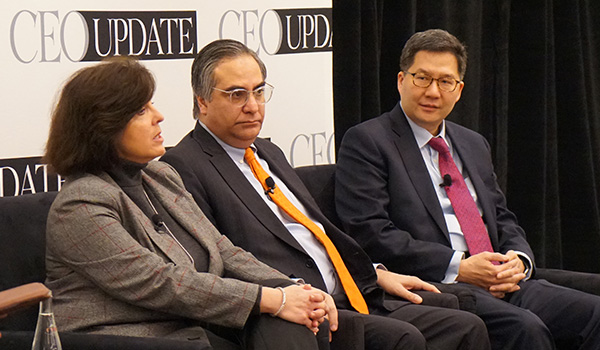CEO Update LIVE: Passion, homework keys in CEO screening
CEO Update LIVE: Passion, homework keys in CEO screening
- February 6, 2019 |
-
 bermangorvine bermangorvine
bermangorvine bermangorvine

Three experts disclose what recruiters and search committees are looking for when they interview candidates for CEO and other senior-level positions.
 Panelists from left to right: Lavet, Adler, Ha
Panelists from left to right: Lavet, Adler, Ha
Now more than ever, would-be association CEOs must do their homework, be prepared for a thorough background check, and most important of all, show passion for the group they would lead, a panel of experts said at the Feb. 6 CEO Update LIVE: Executive Recruiting forum.
"Sometimes people say, ‘I just want to be a CEO.' That's not a good answer," when a search committee asks a candidate why he or she wants the job, said Lorraine Lavet, head of the association practice at executive recruitment firm Korn Ferry. A good answer can show you've really done your homework on the organization, she said.
CEO candidates can research members of the search committee itself through social media to learn their background, but they shouldn't get too personal, she said, for example by bringing up where the committee members live or what their children do.
"There's a difference between passion and stalking," agreed recruiter Julian Ha, practice leader of the government affairs and trade association practices at Heidrick & Struggles.
When his firm interviews candidates, the object is to see, "Is this someone who will resonate with the search committee?" Ha added. "Have they done their homework, are they passionate about this opportunity?"
"You know when someone is passionate about something, and then you know when it's kind of fake B.S. overboard, and it's not real," Ivan Adler, principal at The McCormick Group, said. "People want to hire people that are real. Passion is good."
Passion implies some knowledge of the field represented by the association a CEO seeks to lead, but boards know that they're going to be interviewing people who have 80 percent—rather than all—of the desired experience, Lavet said.
"What they really want to know is, when they're not around … do you have the judgment, the leadership style, the decision-making skills, the ability to deal with the ambiguity that you're facing when they're off doing their day job," she said.
Candidates may never get to the search committee interview if they fail a background check. At a basic level, Lavet said, the candidate's educational background is checked, and "half a dozen times in my career" she has found candidates with faked credentials.
Basic and more advanced versions of social media background reviews are available to associations, she said, and the latter are expensive but are coming down in price. Sometimes these checks reveal "intimate conversations" and inappropriate pictures posted on social media, she said.
An embarrassing Facebook post can't be explained away by admitting to being drunk at the time, Adler warned.
"It's not just what you did, but why you did it," he said. "If you think it's wrong, don't do it."
The event was held at the Fairmont Washington, D.C., hotel and moderated by CEO Update Managing Director Mark Graham.
Read more about the panel discussion in the Feb. 15 issue of CEO Update.
